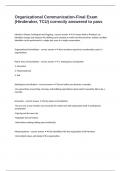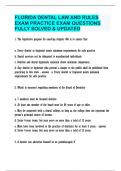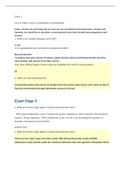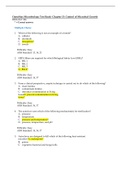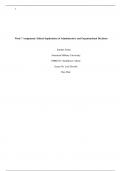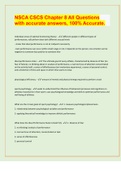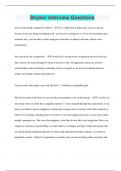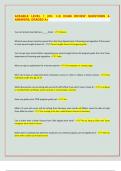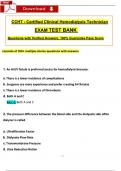(Hinderaker, TCU) correctly answered to pass
Identity is Always Contingent and Ongoing - correct answer ✔✔It is never fixed or finalized. our
identities change and adapt to the shifting social contexts in which we find ourselves. Indeed, multiple
identities can be performed in a single day- even in a single conversation.
Organizational Assimilation - correct answer ✔✔How members experience membership cycles in
organizations.
Phasic View of Assimilation - correct answer ✔✔1. Anticipatory Socialization
2. Encounter
3. Metamorphosis
4. Exit
Anticipatory Socialization - correct answer ✔✔Occurs before you become a member.
-You spend time researching, learning, and building expectations about what it would be like to be a
member.
Encounter - correct answer ✔✔Entry phase of assimilation
-You are now a new member and reconcile the reality met with expectation built in anticipatory
socialization
-Figuring out the new role
-Negotiate how to behave
-Information seeking (asking peers/authority)
Metamorphosis - correct answer ✔✔Fully identified with the organization (Full Member)
-Internalized values and ideals of the organization.
, Exit - correct answer ✔✔Leaving the organization can be voluntary or involuntary.
Three Phases of Exit - correct answer ✔✔1. Pre-Exit
2. Announcement and Exit
3. Post-Exit Sensemaking
Pre-Exit - correct answer ✔✔The decision phase of exit, figuring out if you should leave, usually (not
always) involves information seeking, talking to peers or family and friends.
Announcement and Exit - correct answer ✔✔Announcing to the organization and members that they are
leaving, then leave.
Ex: Employees giving their two-weeks notice to leave.
Post-Exit Sensemaking - correct answer ✔✔Two-Part Process
a) Ex-member makes sense of life being without the organization
b) Members left behind make sense of the organization without the former member.
Vocational Socialization - correct answer ✔✔This occurs long before org-specific anticipatory
socialization.
-Most often this happens in childhood learning how and why things are done from parents, school,
media, entertainment, etc.
Ex: A parent paying their child an allowance for doing chores around the house.
Organizational Osmosis - correct answer ✔✔Quick and easy encounter phase, and move into
metamorphosis: clear expectations from indoctrination at dinner table.
Individualization - correct answer ✔✔Usually occurs during encounter phase of assimilations, and
sometimes the exit phase. This is when the member tries to make the organization fit them.
-Ex: Decorating a dorm room at college to make the room fit you.
-In Exit: inability to individualize often leads to exit.

